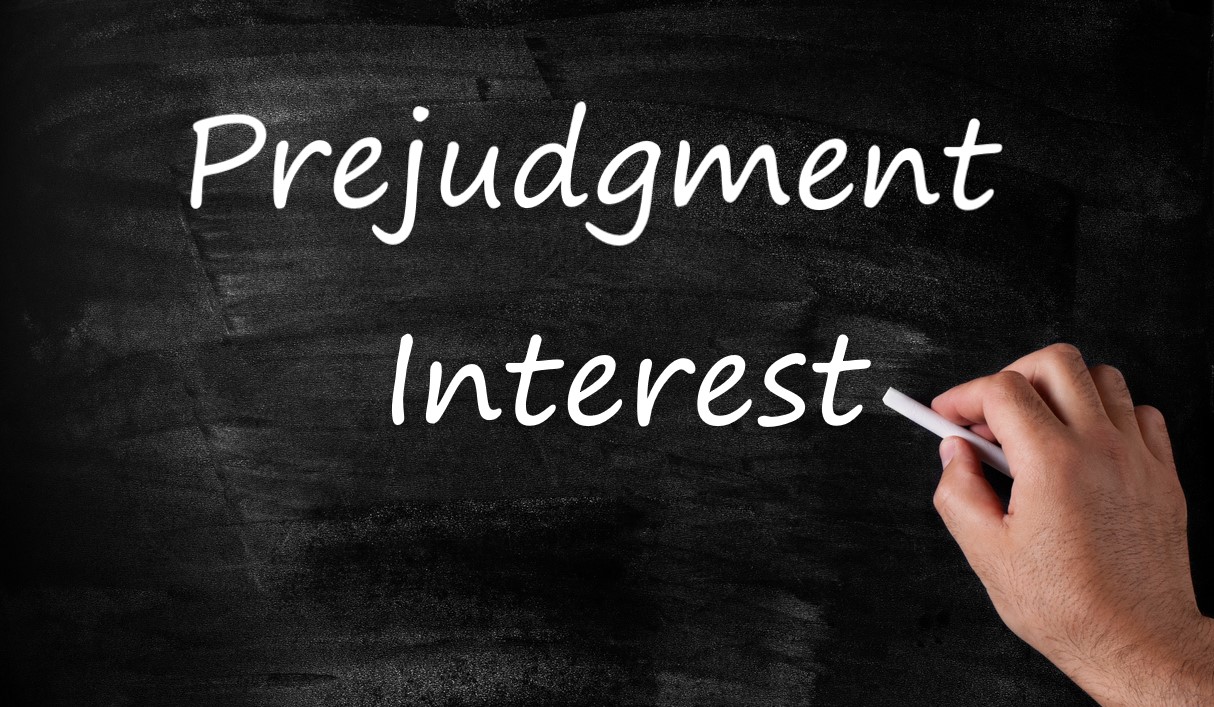Prejudgment Interest: What Is It and How Does It Help Me?
If you’ve ever been injured badly enough that you weren’t able to work, you know that it’s possible to suffer from more than just physical pain: you may have lost wages or steep medical bills. You might have to hire more help around the house, or otherwise spend more money than you would have if you weren’t injured. And if you add any kind of delay in insurance payout, you might be missing out on a significant sum of money. This is the kind of scenario that prejudgment interest is meant to address. Read on for more about how prejudgment interest can help make you whole.
What Is Prejudgment Interest?
Prejudgment interest is interest awarded by a court on top of monetary damages in a lawsuit. It compensates the plaintiff for the loss of access to the money they were owed from the time the harm occurred until the court case is settled, and it takes away any benefit the defendant might have received by holding on to the money they owed the plaintiff. Prejudgment interest partially makes up for the potential earnings that money could have been generated during that time.
How Do You Calculate Prejudgment Interest?
Prejudgment interest is calculated from the date when the action that resulted in the court case occurred, to the time when the court decides to award prejudgment interest. The specific amount of prejudgment interest is calculated differently in every jurisdiction according to factors such as local laws and prevailing interest rates. For example, while the federal prejudgment interest rate is a variable rate, in New York state the rate is 9%. The amount of prejudgment interest can also vary depending on whether the court recommends a simple or compound interest calculation. As an example, see this blog post on how the timing of prejudgment interest affected home repairs following hurricane damage in Florida.
An Example of Prejudgment Interest
Let’s say you hired a contractor to renovate your kitchen in July 2023. The agreed-upon price was $10,000, with half due upfront and the other half upon completion in September 2023. The contractor finished the work late and poorly, and you refuse to pay the remaining $5,000.
In December 2023, you file a lawsuit against the contractor to recover the $5,000 you already paid. By the time the case goes to court (hypothetically in May 2024), you might be entitled to prejudgment interest on top of the $5,000 owed.
From here, we’ll do some example math; to do so, we’ll assume 7% interest in your area, and that the court awarded simple interest rather than compound interest.
* Amount of claim: $5,000
* Date payment became due: September 2023 (completion of the renovation)
* Date of calculation: May 2024 (hypothetical court date)
* Assuming 30 days in September: Number of days between due date and calculation date: (8 months x 30 days/month) + (number of days in May 2024) = 240 days + (let’s say) 15 days = 255 days
We end up with $5,000 x 0.07 (7% converted to decimal) x 255 days / 365 days = $3,57.14
Therefore, if you win the lawsuit, you might be awarded the original $5,000 owed for the work, plus $3,57.14 in prejudgment interest, for a total of $8,357.14.
This is a simplified example, and the actual calculation and legal process can be more complex; it’s always best to consult a lawyer with your specific case.
What Sorts of Cases Qualify for Prejudgment Interest?
There are several kinds of cases that might qualify for prejudgment interest. These include wrongful death, personal injury, a breach of a non-contract obligation, or if you can prove malice, fraud, or negligence on the part of the defendant
In most of these cases, the amount of money involved is fairly specific, and isn’t likely to change. In other words, prejudgment interest is mostly applicable to situations where there is a definite monetary value that has been lost, and which results in the plaintiff losing access to that money (and whatever other money might have been gained during the time the plaintiff didn’t have access to it).
This means that prejudgment interest often doesn’t apply to cases where the plaintiff is asking for compensation for pain and suffering, since that is a fairly subjective concept that is difficult to quantify. Additionally, prejudgment interest frequently doesn’t apply to federal cases (unless there is a question about federal law involved, or if the parties are from two different states and the amount is over $75,000).
What Is the Interest Rate on a Prejudgment in New York?
Under New York law, both pre- and post-judgment interest rates are set at 9% by CPLR § 5004, and the wording of the statute is such that the courts have made prejudgment interest mandatory, not discretionary. Situations where prejudgment interest is applicable are defined by CPLR § 5001(a): interest “shall be recovered” by a prevailing plaintiff in case of a breach of contract, or in an action involving “an act or omission depriving or otherwise interfering with title to, or possession or enjoyment of, property.” (It’s the use of the word shall that the courts have interpreted as making prejudgment interest mandatory.)
How Can Prejudgment Interest Help Me?
Prejudgment interest offers the opportunity for additional compensation by considering the time value of money, and the earnings that may have been lost from loss of access to that money. In other words, when someone owes you money and doesn’t pay, you lose out on the opportunity to invest that money and gain a return.
Prejudgment interest can also encourage speedy resolutions to cases; knowing they’ll owe more money due to accumulating interest can encourage defendants to settle a lawsuit sooner rather than drag it out. This can save everyone involved time and money.
Further Resources on Insurance Coverage Law
Navigating the complexities of insurance claims can feel overwhelming. Whether you’re facing unpaid claims or simply filing for the first time, our eBooks equip you with the crucial information you need to advocate for yourself with confidence.
- Filing A Property Insurance Claim
- Insurance Company Response Time
- What To Do When You Have a Denied/Underpaid Claim
- Wildfire Claims
- Flood Claims Handbook
- More Information on Hurricane Deductible and Policy Limits
- Condominium Hurricane Preparedness
Why Merlin?
Are you fighting an insurance company that won’t pay up on claims? With nearly 40 years of practice and $2 billion in recovered claims, our team stands by your side to ensure you can face any insurance challenge with confidence. Contact us today for a consultation, or read more about how we’re your trusted advocate.




